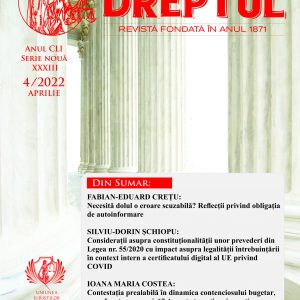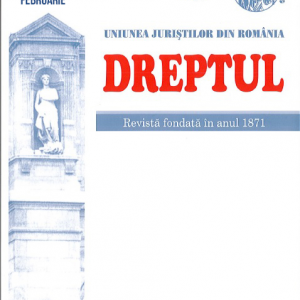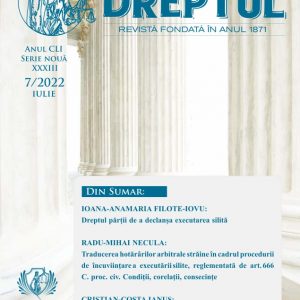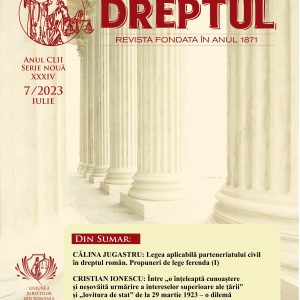-
 The Collective labour contract unique at national level for 2007–2010 was undoubtedly a point of reference in the matter of collective negotiation from Romania, because its contractual clauses established the qualitative accumulations gathered during the conclusion of the collective labour contracts unique at national level, starting with the first contracts concluded after the entry into force of Law No 13/1991 in 1991. Having in view that, under the influence of the Law No 62/2011 (of the social dialogue), the conclusion of the Collective labour contract unique at national level is not permitted, the useful clauses of the mentioned collective labour contract can no longer be applied. In this study it is proposed the emphasis of the essential clauses of the Collective labour contract unique at national level for 2007–2010 and the formulation of a de lege ferenda proposal for their inclusion in the labour legislation.
The Collective labour contract unique at national level for 2007–2010 was undoubtedly a point of reference in the matter of collective negotiation from Romania, because its contractual clauses established the qualitative accumulations gathered during the conclusion of the collective labour contracts unique at national level, starting with the first contracts concluded after the entry into force of Law No 13/1991 in 1991. Having in view that, under the influence of the Law No 62/2011 (of the social dialogue), the conclusion of the Collective labour contract unique at national level is not permitted, the useful clauses of the mentioned collective labour contract can no longer be applied. In this study it is proposed the emphasis of the essential clauses of the Collective labour contract unique at national level for 2007–2010 and the formulation of a de lege ferenda proposal for their inclusion in the labour legislation. -
 In the new Civil Procedure Code, a great number of court decisions remain final in the appeal in tribunals or courts of appeal, and there is no procedural way to fight against illegal or unfounded decisions. Given the judicial realities of our country, it is speculative to believe that the enforcement of the NCPC will automatically stop tribunals and courts of appeal from pronouncing illegal or unfounded decisions. Therefore, it is only natural that an adequate regulation is adopted, by the reintroduction of the action for cancellation as a last remedy for the correction of illegal or unfounded decisions. Although the action for cancellation proved its utility, it was eliminated from the Civil Procedure Code, by the Government Emergency Ordinance no. 58/2003, amending and supplementing the Civil Procedure Code. The parties in the trials for which the decisions remain final in the appeals filed with various tribunals and courts of appeal do not have access to the High Court of Cassation and Justice, and in these circumstances illegal or unfounded decisions are not submitted to the judicial control of the latter. The requirement to correct illegal or unfounded judgements passed by the courts of law is provided by art. 6 § 1 in the European Convention of Human Rights, art. 1 par. 3 and art. 124 in the Constitution, moral rules and the precepts of the Holy Bible, the sacred book of Christianity, according to which all deeds and actions of people must be based on truth and justice.
In the new Civil Procedure Code, a great number of court decisions remain final in the appeal in tribunals or courts of appeal, and there is no procedural way to fight against illegal or unfounded decisions. Given the judicial realities of our country, it is speculative to believe that the enforcement of the NCPC will automatically stop tribunals and courts of appeal from pronouncing illegal or unfounded decisions. Therefore, it is only natural that an adequate regulation is adopted, by the reintroduction of the action for cancellation as a last remedy for the correction of illegal or unfounded decisions. Although the action for cancellation proved its utility, it was eliminated from the Civil Procedure Code, by the Government Emergency Ordinance no. 58/2003, amending and supplementing the Civil Procedure Code. The parties in the trials for which the decisions remain final in the appeals filed with various tribunals and courts of appeal do not have access to the High Court of Cassation and Justice, and in these circumstances illegal or unfounded decisions are not submitted to the judicial control of the latter. The requirement to correct illegal or unfounded judgements passed by the courts of law is provided by art. 6 § 1 in the European Convention of Human Rights, art. 1 par. 3 and art. 124 in the Constitution, moral rules and the precepts of the Holy Bible, the sacred book of Christianity, according to which all deeds and actions of people must be based on truth and justice. -
 The study analyzes several proposals to ensure the settlement with celerity of the civil trial. The authors consider that these are the following: providing the necessary staff; generalization of the process of digitalization of justice and the transition to the „online civil trial”; transferring the competence to settle non-contentious application for certain areas to other authorities; extension of the special simplified proceedings carried on exclusively in writing or even without summoning the parties; pronouncing the judgments in civil matters only after they are motivated; abandoning the verification of the material competence in the stage of regularization; proposal to repeal the procedure for regularization of the application for summons. A very important proposal is the one that suggests that the pronouncing of judgments in civil matters should be made only after they are motivated. The authors consider that it is necessary for the drawing up to be made prior to the pronouncement of the judgment, because the considerations must be identified and formulated before the pronouncement, because they must necessarily be the basis for transposing the law by the act of justice. Another important aspect proposed by the authors is the complete repeal of the regularization procedure in its current form and the establishment of the first trial term in the urgent cases after a period of two weeks from the registration of the application and 30 days later in the case of the other applications, following that the possible measures of regularization be ordered by the judge at the first trial term with the summoning procedure being legally fulfilled, following that, practically, in a period of maximum two months, it will be possible to proceed to the investigation of the trial.
The study analyzes several proposals to ensure the settlement with celerity of the civil trial. The authors consider that these are the following: providing the necessary staff; generalization of the process of digitalization of justice and the transition to the „online civil trial”; transferring the competence to settle non-contentious application for certain areas to other authorities; extension of the special simplified proceedings carried on exclusively in writing or even without summoning the parties; pronouncing the judgments in civil matters only after they are motivated; abandoning the verification of the material competence in the stage of regularization; proposal to repeal the procedure for regularization of the application for summons. A very important proposal is the one that suggests that the pronouncing of judgments in civil matters should be made only after they are motivated. The authors consider that it is necessary for the drawing up to be made prior to the pronouncement of the judgment, because the considerations must be identified and formulated before the pronouncement, because they must necessarily be the basis for transposing the law by the act of justice. Another important aspect proposed by the authors is the complete repeal of the regularization procedure in its current form and the establishment of the first trial term in the urgent cases after a period of two weeks from the registration of the application and 30 days later in the case of the other applications, following that the possible measures of regularization be ordered by the judge at the first trial term with the summoning procedure being legally fulfilled, following that, practically, in a period of maximum two months, it will be possible to proceed to the investigation of the trial. -
 In the study hereby, the author makes some de lege ferenda proposals with reference to amending/supplementing Article 28 of the Companies Law 31/1990 (republished on November 17th, 2009), text governing the obligations of the constituent assembly of the joint-stock company incorporated by public subscription.
In the study hereby, the author makes some de lege ferenda proposals with reference to amending/supplementing Article 28 of the Companies Law 31/1990 (republished on November 17th, 2009), text governing the obligations of the constituent assembly of the joint-stock company incorporated by public subscription. -
 In the study with the above title, the author examines specifically the problems of the current regulation of the protection of competition on the internal market of the European Union, through the control of concentrations of undertakings, in the light of the provisions included in the Council Regulation (EC) No 139/2004 of 20 January 2004 on the control of the concentrations between undertakings.
In the study with the above title, the author examines specifically the problems of the current regulation of the protection of competition on the internal market of the European Union, through the control of concentrations of undertakings, in the light of the provisions included in the Council Regulation (EC) No 139/2004 of 20 January 2004 on the control of the concentrations between undertakings. -
 Given that the new General Data Protection Regulation has influenced most of the industrial sectors, new challenges in life science area have also been generated, particularly those regarding the effective protection of the personal data of the patients – subjects to clinical trials. The new changes focus mainly on how data and the rights of the data subjects are perceived by these persons, as well as the controllers and processors. This study aims to identify and determine the impact of this regulation on clinical trials and patient engagement policies, having also into consideration the derogations from the rights of data subjects for the purpose of scientific research. Also, we seek to define concepts such as sensitive data, health data, clinical trial data, the obtained results following the clinical trials, data processing, as well as notions related to the parties involved – either the patients or CROs (contract research organizations) understood through the meaning of the terms of natural person or controller, processor, recipient respectively. We want to clarify to what extent the clinical trials can be included in the scientific research that the Regulation refers to and whether its application in this area makes a distinction between the goals of the research: either the one of profit-making or the one of developing the medical knowledge.
Given that the new General Data Protection Regulation has influenced most of the industrial sectors, new challenges in life science area have also been generated, particularly those regarding the effective protection of the personal data of the patients – subjects to clinical trials. The new changes focus mainly on how data and the rights of the data subjects are perceived by these persons, as well as the controllers and processors. This study aims to identify and determine the impact of this regulation on clinical trials and patient engagement policies, having also into consideration the derogations from the rights of data subjects for the purpose of scientific research. Also, we seek to define concepts such as sensitive data, health data, clinical trial data, the obtained results following the clinical trials, data processing, as well as notions related to the parties involved – either the patients or CROs (contract research organizations) understood through the meaning of the terms of natural person or controller, processor, recipient respectively. We want to clarify to what extent the clinical trials can be included in the scientific research that the Regulation refers to and whether its application in this area makes a distinction between the goals of the research: either the one of profit-making or the one of developing the medical knowledge. -
 The system of protection of human rights and fundamental freedoms introduced by the European Convention on Human Rights still raises questions about the interpretation and application of its provisions. In this study, we will focus on the problems concerning: EU accession to the European Convention on Human Rights, the relationship between the CJEU and the ECHR, and we will detail the decision of the ECJ Opinion 2/13 on the draft agreement for EU accession to the European Convention on Human Rights. By the present study we intend to analyze the implications of the future EU accession to the European Convention on Human Rights, given the long history of the protection of fundamental rights. We will start with the way in which the protection of fundamental rights is seen at international level, and then we will analyze how the EU intends to achieve the protection of fundamental human rights. We will bring into discussion the main normative acts in the field, the way in which the collaboration between the CJEU and the ECHR is carried out, pointing out the issue of the primacy of European law over the national one. The study aims to analyze the general concepts recognized in the international law regarding the creation of a better structured legal framework regarding the protection of fundamental human rights and the issue of the primacy of EU law regarding the future accession to the Convention, in particular in relation to the Negative Opinion 2/13 of the CJEU. We will analyze the most important decisions of the ECHR and the CJEU in order to corroborate the theoretical elements with the practical ones. As concerns the research methods, mainly the comparative and the quantitative method have been used, with elements that make reference to the method of sociological and historical interpretation. From the point of view of the research results, it was concluded that, from a doctrinal point of view, there are two sides: the supporters of EU accession to the European Convention on Human Rights, in the context of receiving EU legal personality, but also of inserting Article 6 TEU which provides the obligativity that EU becomes a party to the Convention, and those who oppose, in particular the CJEU, as well as the practitioners and the doctrinaires of the European law who invoke the primacy of European law over national law, but also the issue of organizing the European legal system, by specifying that the CJEU would fall under the jurisdiction of the ECHR, and the ECHR, in its turn, would intervene in the process of „constitutional” development of the EU.
The system of protection of human rights and fundamental freedoms introduced by the European Convention on Human Rights still raises questions about the interpretation and application of its provisions. In this study, we will focus on the problems concerning: EU accession to the European Convention on Human Rights, the relationship between the CJEU and the ECHR, and we will detail the decision of the ECJ Opinion 2/13 on the draft agreement for EU accession to the European Convention on Human Rights. By the present study we intend to analyze the implications of the future EU accession to the European Convention on Human Rights, given the long history of the protection of fundamental rights. We will start with the way in which the protection of fundamental rights is seen at international level, and then we will analyze how the EU intends to achieve the protection of fundamental human rights. We will bring into discussion the main normative acts in the field, the way in which the collaboration between the CJEU and the ECHR is carried out, pointing out the issue of the primacy of European law over the national one. The study aims to analyze the general concepts recognized in the international law regarding the creation of a better structured legal framework regarding the protection of fundamental human rights and the issue of the primacy of EU law regarding the future accession to the Convention, in particular in relation to the Negative Opinion 2/13 of the CJEU. We will analyze the most important decisions of the ECHR and the CJEU in order to corroborate the theoretical elements with the practical ones. As concerns the research methods, mainly the comparative and the quantitative method have been used, with elements that make reference to the method of sociological and historical interpretation. From the point of view of the research results, it was concluded that, from a doctrinal point of view, there are two sides: the supporters of EU accession to the European Convention on Human Rights, in the context of receiving EU legal personality, but also of inserting Article 6 TEU which provides the obligativity that EU becomes a party to the Convention, and those who oppose, in particular the CJEU, as well as the practitioners and the doctrinaires of the European law who invoke the primacy of European law over national law, but also the issue of organizing the European legal system, by specifying that the CJEU would fall under the jurisdiction of the ECHR, and the ECHR, in its turn, would intervene in the process of „constitutional” development of the EU. -
 International treaties on human rights are, in relation to the common law, the most important human rights source of international law. In terms of geography, the international treaties under the cited matter are divided into treaties with universal vocation (UN system) and regional international treaties (European regional level, Inter-American, African and so on). In this study, the author refers to the specificity of the conventional sources within the Inter-American and African system, the Arab and Islamic world and within the CIS area.
International treaties on human rights are, in relation to the common law, the most important human rights source of international law. In terms of geography, the international treaties under the cited matter are divided into treaties with universal vocation (UN system) and regional international treaties (European regional level, Inter-American, African and so on). In this study, the author refers to the specificity of the conventional sources within the Inter-American and African system, the Arab and Islamic world and within the CIS area. -
 The Lisbon Treaty is designed to replace the Treaty establishing a Constitution for Europe. Its adoption brings about an improvement of the institutional law system of the European Union, due to the coming into force of the Charter of the Fundamental Rights of the European Union. It was proclaimed by the European institutions (the European Commission, the European Parliament and the Council of the European Union) on the occasion of the European Council of Nice on 7 December 2000 and its wording states for the first time in a single document, on the whole, the social, economic, civil and political rights that all the European citizens can benefit of.
The Lisbon Treaty is designed to replace the Treaty establishing a Constitution for Europe. Its adoption brings about an improvement of the institutional law system of the European Union, due to the coming into force of the Charter of the Fundamental Rights of the European Union. It was proclaimed by the European institutions (the European Commission, the European Parliament and the Council of the European Union) on the occasion of the European Council of Nice on 7 December 2000 and its wording states for the first time in a single document, on the whole, the social, economic, civil and political rights that all the European citizens can benefit of. -

-
 The aim of the present paper is to cover the main aspects regarding the legal treatment of classified information in the Romanian criminal legislation by presenting, from a critical standpoint, the current regulation of the access to classified information in the course of the criminal proceedings, with a special focus on the lawyer’s access to such information, as well as by providing an overview of the substantial criminal provisions protecting classified information. With respect to the procedural standards, the underlying idea emerging from the detailed analysis of the legislation in force is that currently there is an unjustified difference in treatment within the criminal proceedings regarding lawyers, on the one hand, and magistrates, on the other hand, the former category being prevented from benefiting from an unhindered access to classified information, which directly affects the rights of the defence. As far as the criminal protection of classified information is concerned, the Romanian criminal code incriminates a variety of acts that imply the illicit disclosure of classified information, pertaining to either state or professional secrecy, and are prejudicial to the national security, the state defence as well as some public or private entities, as the case may be.
The aim of the present paper is to cover the main aspects regarding the legal treatment of classified information in the Romanian criminal legislation by presenting, from a critical standpoint, the current regulation of the access to classified information in the course of the criminal proceedings, with a special focus on the lawyer’s access to such information, as well as by providing an overview of the substantial criminal provisions protecting classified information. With respect to the procedural standards, the underlying idea emerging from the detailed analysis of the legislation in force is that currently there is an unjustified difference in treatment within the criminal proceedings regarding lawyers, on the one hand, and magistrates, on the other hand, the former category being prevented from benefiting from an unhindered access to classified information, which directly affects the rights of the defence. As far as the criminal protection of classified information is concerned, the Romanian criminal code incriminates a variety of acts that imply the illicit disclosure of classified information, pertaining to either state or professional secrecy, and are prejudicial to the national security, the state defence as well as some public or private entities, as the case may be. -

